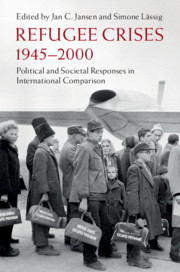Book contents
- Refugee Crises, 1945–2000
- Publications of the German Historical Institute
- Refugee Crises, 1945–2000
- Copyright page
- Contents
- Contributors
- Acknowledgments
- 1 Responses to Refugee Crises in International Comparison
- Part I The Postwar and Decolonization Moment
- 2 The Dynamics of Expellee Integration in Post-1945 Europe
- 3 Integrating without a Host Society
- 4 Pakistan
- 5 Transgenerational Displacement and Integration among Palestinians and Palestinian Refugees from Syria in Jordan
- 6 A Matter of Definition
- Part II Refugee Movements during the Cold War and beyond
- Part III Afterword
- Index
5 - Transgenerational Displacement and Integration among Palestinians and Palestinian Refugees from Syria in Jordan
from Part I - The Postwar and Decolonization Moment
Published online by Cambridge University Press: 13 October 2023
- Refugee Crises, 1945–2000
- Publications of the German Historical Institute
- Refugee Crises, 1945–2000
- Copyright page
- Contents
- Contributors
- Acknowledgments
- 1 Responses to Refugee Crises in International Comparison
- Part I The Postwar and Decolonization Moment
- 2 The Dynamics of Expellee Integration in Post-1945 Europe
- 3 Integrating without a Host Society
- 4 Pakistan
- 5 Transgenerational Displacement and Integration among Palestinians and Palestinian Refugees from Syria in Jordan
- 6 A Matter of Definition
- Part II Refugee Movements during the Cold War and beyond
- Part III Afterword
- Index
Summary
The case of Palestinians and Palestinian refugees from Syria (PRS) in Jordan raises the question of how a host society addresses transgenerational displacement. This essay examines how the policy of nonforcible return has been carried out in practice. It argues that the security aspect of refugee assistance has determined the mechanisms that facilitate integration.Security in this context needs to be viewed in two ways: in terms of the state’s perception of the movement of refugees through the borders of the state and the boundaries between the camp and the cities, and from the perspective of the refugees’ personal security, in terms of welfare and socioeconomic stability. The essay analyzes the significance of identity in Jordan. As the Palestinian community has steadily grown since 1948, a schism has emerged between the East Bank Jordanian and the Palestinian-Jordanian communities as the Jordanian population became the minority community. The essay considers how far the insecurity experienced by the host state impacts its refugee policies and whether the country can sustain a policy of integration once the postwar period arrives.
Keywords
Information
- Type
- Chapter
- Information
- Refugee Crises, 1945-2000Political and Societal Responses in International Comparison, pp. 104 - 123Publisher: Cambridge University PressPrint publication year: 2020
